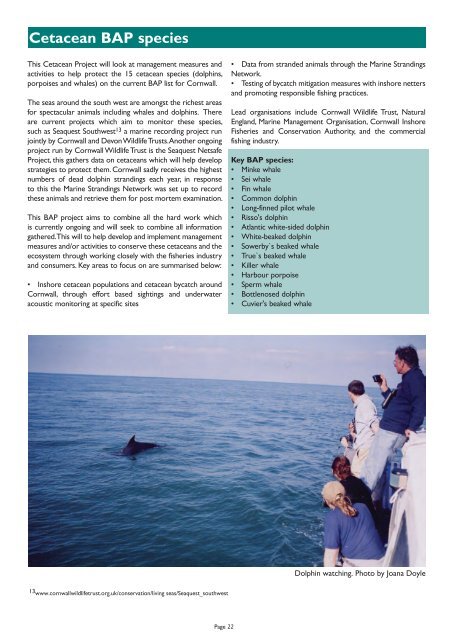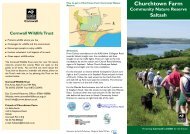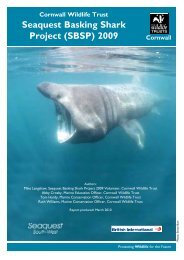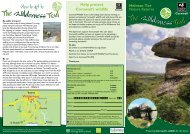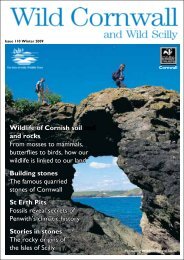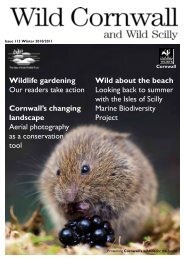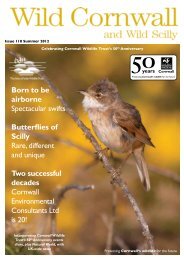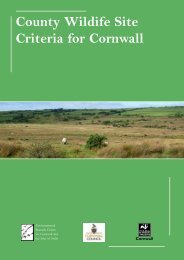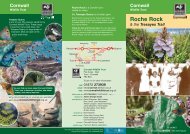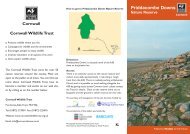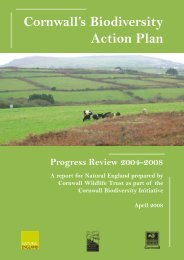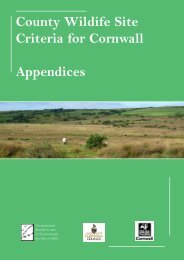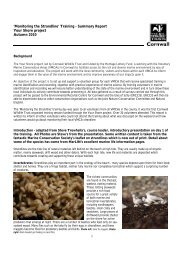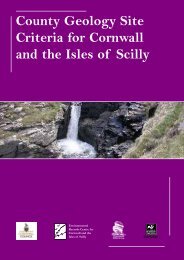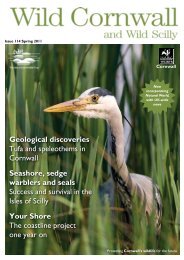Cornwall's Biodiversity Action Plan - Cornwall Wildlife Trust
Cornwall's Biodiversity Action Plan - Cornwall Wildlife Trust
Cornwall's Biodiversity Action Plan - Cornwall Wildlife Trust
Create successful ePaper yourself
Turn your PDF publications into a flip-book with our unique Google optimized e-Paper software.
Cetacean BAP species<br />
This Cetacean Project will look at management measures and<br />
activities to help protect the 15 cetacean species (dolphins,<br />
porpoises and whales) on the current BAP list for <strong>Cornwall</strong>.<br />
The seas around the south west are amongst the richest areas<br />
for spectacular animals including whales and dolphins. There<br />
are current projects which aim to monitor these species,<br />
such as Seaquest Southwest 13 a marine recording project run<br />
jointly by <strong>Cornwall</strong> and Devon <strong>Wildlife</strong> <strong>Trust</strong>s. Another ongoing<br />
project run by <strong>Cornwall</strong> <strong>Wildlife</strong> <strong>Trust</strong> is the Seaquest Netsafe<br />
Project, this gathers data on cetaceans which will help develop<br />
strategies to protect them. <strong>Cornwall</strong> sadly receives the highest<br />
numbers of dead dolphin strandings each year, in response<br />
to this the Marine Strandings Network was set up to record<br />
these animals and retrieve them for post mortem examination.<br />
This BAP project aims to combine all the hard work which<br />
is currently ongoing and will seek to combine all information<br />
gathered. This will to help develop and implement management<br />
measures and/or activities to conserve these cetaceans and the<br />
ecosystem through working closely with the fisheries industry<br />
and consumers. Key areas to focus on are summarised below:<br />
• Inshore cetacean populations and cetacean bycatch around<br />
<strong>Cornwall</strong>, through effort based sightings and underwater<br />
acoustic monitoring at specific sites<br />
• Data from stranded animals through the Marine Strandings<br />
Network.<br />
• Testing of bycatch mitigation measures with inshore netters<br />
and promoting responsible fishing practices.<br />
Lead organisations include <strong>Cornwall</strong> <strong>Wildlife</strong> <strong>Trust</strong>, Natural<br />
England, Marine Management Organisation, <strong>Cornwall</strong> Inshore<br />
Fisheries and Conservation Authority, and the commercial<br />
fishing industry.<br />
Key BAP species:<br />
• Minke whale<br />
• Sei whale<br />
• Fin whale<br />
• Common dolphin<br />
• Long-finned pilot whale<br />
• Risso's dolphin<br />
• Atlantic white-sided dolphin<br />
• White-beaked dolphin<br />
• Sowerby`s beaked whale<br />
• True`s beaked whale<br />
• Killer whale<br />
• Harbour porpoise<br />
• Sperm whale<br />
• Bottlenosed dolphin<br />
• Cuvier's beaked whale<br />
Dolphin watching. Photo by Joana Doyle<br />
13 www.cornwallwildlifetrust.org.uk/conservation/living seas/Seaquest_southwest<br />
Page 22


